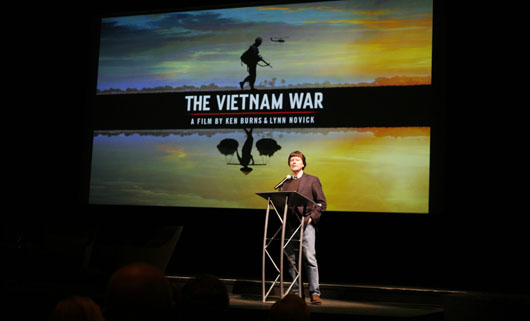by WorldTribune Staff, October 6, 2017
The new documentary series “The Vietnam War” ignores why the U.S. entered the war and overlooks facts that ultimately could have won the war, a former National Security Council (NSC) member wrote.
The series by Ken Burns and Lynn Novick “is most certainly a TV tour de force replete with information which basically sought to confirm the view that the war, so costly in lives and treasure, was unwinnable and accomplished nothing,” William Lloyd Sherman, who served on the NSC staff under Presidents Nixon, Ford, Reagan and George H.W. Bush, wrote in an analysis/opinion for The Washington Times on Oct. 4.

The series “ignored why we got into this war in the first place,” Sherman wrote.
“President Eisenhower clearly enunciated the need to defend South Vietnam in an April 7, 1955 speech, stating the loss of Indochina could create a falling domino effect, spreading communism throughout Southeast Asia, notably Burma, Thailand, the Malay Peninsula and Indonesia.
“Leaders of nations in the area took Eisenhower’s warning seriously, as did leaders in Hanoi and (then) Peking. Our military intervention in Vietnam effectively prevented the dominoes from falling, to which leaders in the area attested, which means we achieved a strategic victory even though we lost in Vietnam.
“This all is cited to prove that the war was, by no means, totally fought in vain, as the series would have us believe.”
Sherman continued: “My arrival in South Vietnam in December 1965 began 10 straight years of involvement with this country from the rice paddies to the White House.
“Shortly after I arrived, I learned that in a nearby village two young women, a nurse and a teacher, had just been murdered by the Viet Cong. This convinced me that our cause was just. This was part of the Viet Cong’s intimidating all those who, like the two young women, represented a government presence. By 1972, more than 37,000 people in this category had been murdered by the Vietcong. This was never reported by our news media nor covered in the series.
“Another key development was the large-scale reduction of the Viet Cong due to heavy losses during the 1968 Tet Offensive from which they never really recovered. This was not reported by our news media and was scanted in the series. The weakening of the Viet Cong greatly facilitated rural pacification which, before long, resulted in one of the most successful land reforms in history. Virtually all peasants now owned their own land. This, of course, was never reported by our media and is scarcely mentioned in the series.”
Sherman also cites the 1972 Easter Offensive, “the first large-scale conventional enemy attack in the war replete with large numbers of Soviet tanks, long-range artillery, rockets and other weaponry. All of the ground troops were South Vietnamese. The last U.S. ground troops had left South Vietnam as the result of Vietnamization. The only U.S. battlefield presence was advisers and forward air controllers.
“I was caught in the path of the main offensive thrust and came out of this experience convinced that our side was losing. Massive U.S. air power made a critical difference. The series covered this offensive in some detail, but neglected to describe just how badly off these North Vietnamese troops indeed were. They had lost 100,000 killed in action, twice as many KIAs as the U.S. had suffered in the entire war.
“Had the series contributors done their homework, they would have known that after the final communist victory in 1975, a senior North Vietnamese general wrote in the party newspaper that by the fall of 1972, his troops were on the ropes and on the verge of defeat.”
The documentary, Sherman continued, “did not describe how the communist side avoided defeat by conning my boss, Henry Kissinger, into resuming negotiations and offering Mr. Kissinger concessions he had been trying to get.
“The series should have stressed how Washington micromanagement prevented us from invading Laos and Cambodia for fear of ‘widening the war.’ Had we been able to block the Laos Ho Chi Minh Trail with ground forces and denied Cambodia to enemy headquarters and logistic centers, we would most probably have won the war.”
Subscribe to Geostrategy-Direct __________ Support Free Press Foundation
